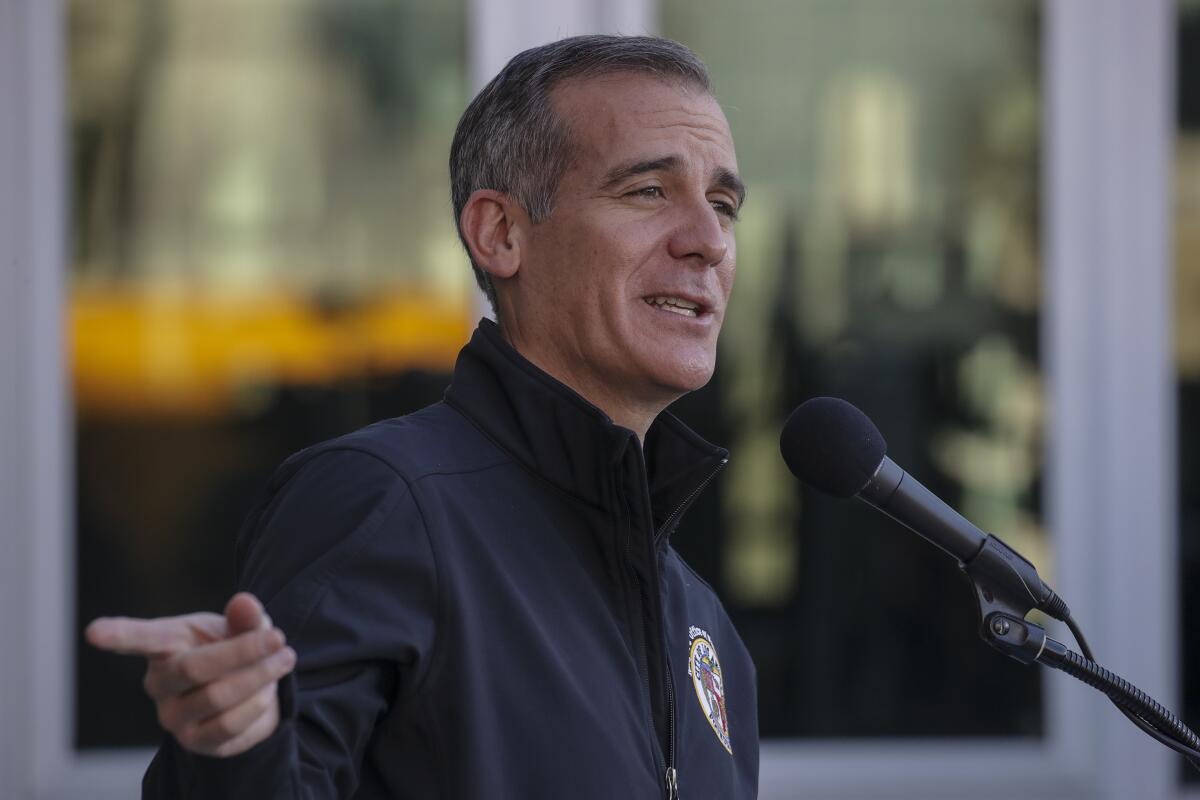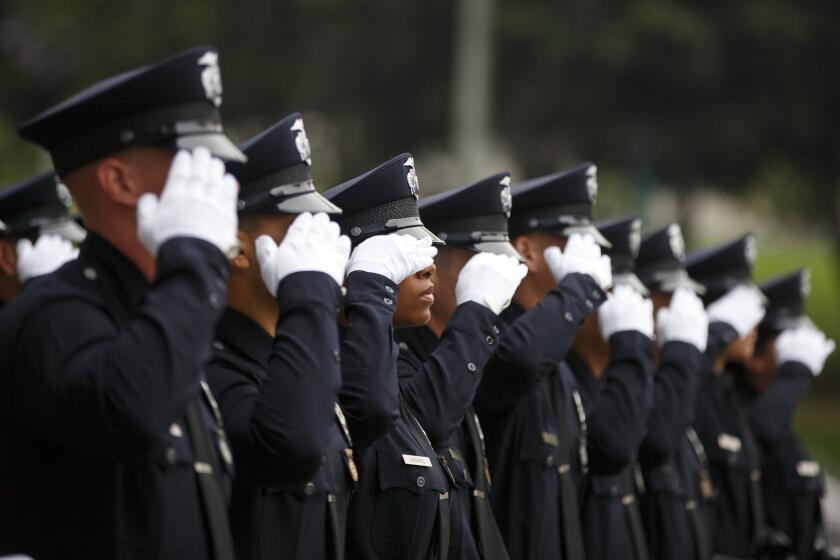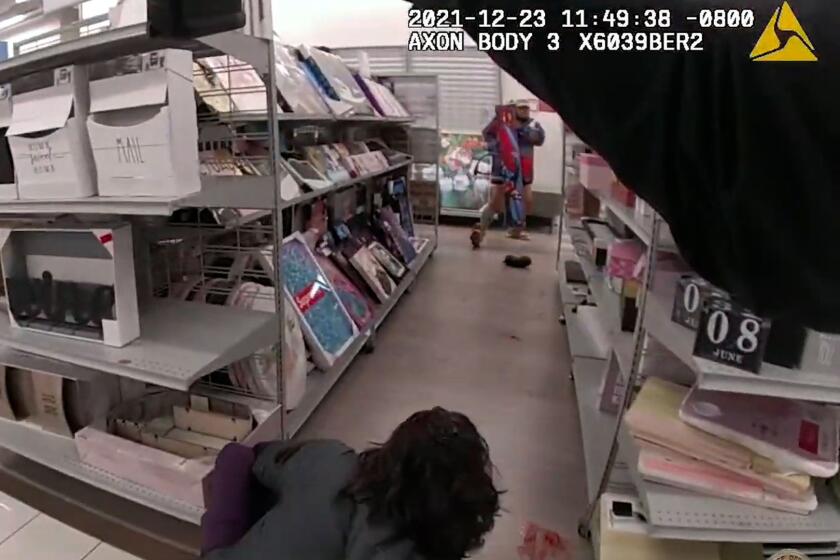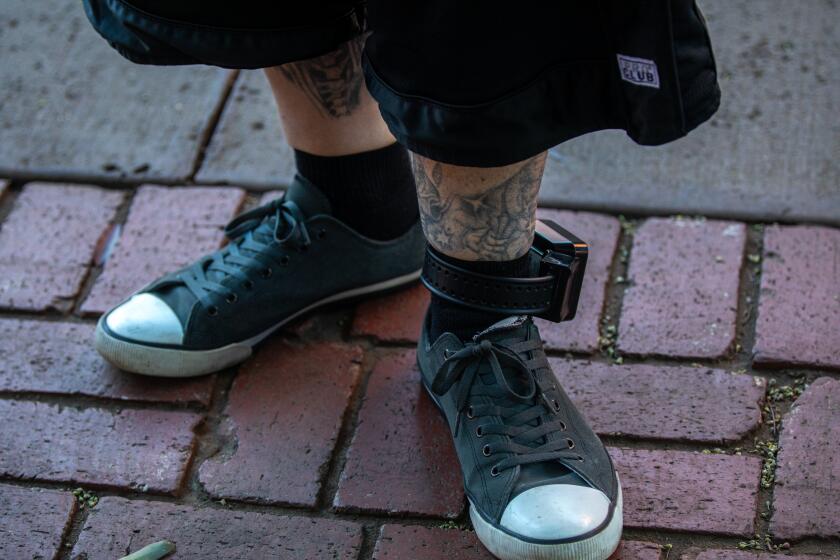Garcetti questions LAPD discipline for out-of-policy police shootings, orders review

Los Angeles Mayor Eric Garcetti on Thursday questioned whether LAPD officers who shoot people are sufficiently punished when the shootings violate department policies, ordering a review of such cases going back years.
Garcetti said that “quite often,” stiff penalties supported by elected officials and police leaders never materialize in such cases because discipline panels hand down lesser penalties — sometimes leaving officers who officials want to fire on the force.
Citing that and a report by the LAPD’s inspector general last year that found newer, all-civilian discipline panels have been even more lenient on errant officers, Garcetti said he had ordered the inspector general to assess the issue once more — this time producing a public report that will outline the discipline received by officers found to have broken policy in shootings in recent years, as well as the outcomes of any appeals they made to those punishments.
During an end-of-year news conference on crime and policing in 2021 that covered an uptick in homicides but also in police shootings, Garcetti said the review would provide “a clearer understanding” of whether the current discipline process is “fair” and “just” — and what reforms are needed.
Craig Lally, president of the union that represents rank-and-file officers and which negotiates disciplinary processes with the department through collective bargaining negotiations, said the LAPD already has “robust civilian oversight” over officer discipline.
A review of recent police misconduct cases by the LAPD inspector general found all-civilian hearing panels were more lenient on accused officers.
“What Mayor Garcetti ought to be focused on, before he departs to India, is how to reduce the 54% increase in homicides and shooting victims since 2019 that are causing terror in our city, especially amongst our Black and Latino residents who make up a disproportionate amount of these victims,” Lally said.
Garcetti’s comments come as he eyes a departure to become the United States’ ambassador to India, and amid intense scrutiny for the LAPD after officers in 2021 shot 37 people, killing 18 — including a 14-year-old bystander in a Burlington store two days before Christmas.
The 2021 figures represent a sharp increase from the 27 LAPD shootings, seven of them fatal, in 2020, and 26 shootings, 12 of them fatal, in 2019. The 2019 figures marked a 30-year low in LAPD shootings.
LAPD Chief Michel Moore on Tuesday said that the department would be conducting a “deep dive” review of its training around the use of deadly force, to ensure officers are familiar with the department’s policies and the requirement that they show a “reverence for human life” — even when confronting dangerous suspects.
Garcetti mentioned that training audit during his Thursday comments as well, just before announcing the inspector general’s assessment of past punishments in bad shootings.
While prosecutors can review police shootings in cases where they believe officers may have broken the law, internal investigators within the LAPD review every police shooting for policy violations — breaking down every action of the involved officers and analyzing the tactics they used.
The findings of those internal reviews then go before internal LAPD review panels, then to the Police Commission, and then on to what are known as Board of Rights hearings — which are closed to the public and where officers can plead their cases before panels of other officers or civilian hearing officers.
The Los Angeles Police Department will audit and revise how it trains officers on the use of deadly force after police shootings increased sharply in 2021, officials said Tuesday.
The discipline process traditionally involved panels comprised of other officers, but added a single civilian member in 1992 in the face of reform demands after Rodney King’s beating and the subsequent unrest in L.A.
The hearings were open to the public until 2006, when a California Supreme Court ruling was interpreted by the city attorney’s office to preclude the city from airing such disciplinary hearings publicly.
In 2019, the City Council approved a measure creating an all-civilian panel option, after voters approved a charter amendment allowing them to do so in 2017.
Garcetti backed the change at the time, as did the police union. Garcetti said members of the public should have a role in overseeing police. Activist groups, which opposed the change, argued it would result in less officer accountability.
Last year, a review of recent police misconduct cases by the inspector general found that all-civilian hearing panels were more lenient on accused officers than were the more traditional panels of two officers and one civilian.
The review found that all-civilian panels recommended a lesser penalty than Moore had recommended in more than 70% of the most serious cases that came before them, leaving 11 officers on the force who otherwise would have been fired.
Police Commission President William Briggs on Thursday said Garcetti verbally requested the latest review during a meeting earlier this week, and that the commission will formally request the inspector general conduct it and report back within 30 days at one of its upcoming public meetings.
The commission will ask that the report outline the discipline imposed in all shootings found to be out of policy from 2015 to 2020, as well as the outcome of any appeals to that discipline, Briggs said. Information as to whether or not the individual who was shot by police was armed with a firearm will also be included, Briggs said.
The report will anonymize the information to get around restrictions on releasing discipline information for individual officers, Briggs said.
The review will not cover 2021 shootings, because the commission has yet to determine whether the officers involved in those shootings broke any policies, Briggs said.
An analysis by The Times last year determined that the commission found significant flaws in the actions of officers in a majority of fatal shootings since 2018, including that they fired unnecessary shots or failed to effectively communicate with each other.
More to Read
Sign up for Essential California
The most important California stories and recommendations in your inbox every morning.
You may occasionally receive promotional content from the Los Angeles Times.













